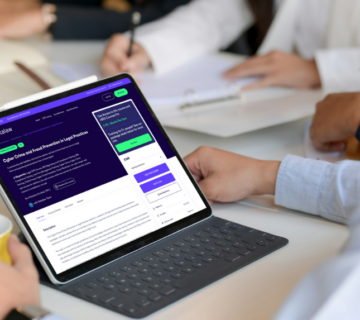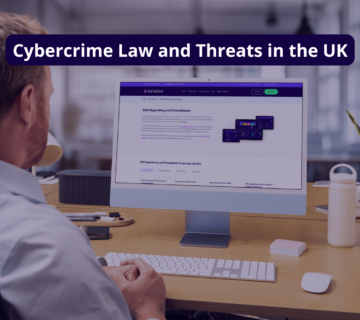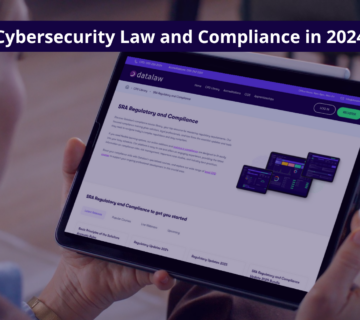Download our Free “Cyber Crime and Prevention of Fraud in Legal Practices” E-Book
Email Scams: The Phishing Menace
Email scams, particularly phishing, are a pervasive form of cybercrime that legal practitioners need to be vigilant about. Phishing emails often appear as seemingly legitimate communications, designed to deceive recipients into revealing sensitive information, such as login credentials or financial data. Here’s how to protect your legal practice from email scams:
- Awareness: Train your staff to recognise common phishing indicators, such as misspelt email addresses, suspicious attachments, or requests for sensitive information via email.
- Verification: Always verify the authenticity of emails requesting sensitive data or funds. Contact the sender using known, legitimate contact details to confirm the request’s legitimacy.
- Cybersecurity Software: Implement robust email security solutions and regularly update antivirus software to detect and block phishing attempts.
Invoice Redirection: Guarding Against Financial Loss
Invoice redirection fraud is a crafty scheme in which cybercriminals manipulate payment details on invoices, redirecting funds to their accounts instead of the intended recipient. To protect your legal practice from this threat:
- Verification: Verify any changes to payment details with the vendor or client through trusted channels before processing payments.
- Dual Authorisation: Implement a dual-authorisation process for financial transactions, requiring approval from multiple individuals within the firm.
- Educate Staff: Train your team to be cautious when handling financial transactions and to be wary of sudden or unexplained changes in payment instructions.
Social Engineering: Manipulating Human Psychology
Social engineering is a form of cybercrime where attackers exploit human psychology to manipulate individuals into revealing confidential information. This can involve impersonation, manipulation, or deception. To defend against social engineering:
- Security Training: Provide ongoing security awareness training to staff, emphasising the importance of verifying identities and information before sharing sensitive data.
- Strong Authentication: Implement multi-factor authentication (MFA) for access to critical systems and data, adding an extra layer of security.
- Incident Response: Develop an incident response plan to swiftly address and mitigate the impact of any successful social engineering attacks.
Friday Afternoon Fraud: Intercepting Legal Transactions
Friday Afternoon Fraud is a sophisticated scam wherein cybercriminals intercept communications between legal practitioners and clients, posing as legitimate parties. To prevent falling victim to this form of fraud:
- Secure Communications: Use encrypted communication channels and secure file-sharing platforms to protect sensitive client information.
- Verification Protocols: Establish a robust process for verifying the identity of clients and other parties involved in transactions.
- Training and Awareness: Educate your team on the risks of Friday Afternoon Fraud and the importance of rigorous verification procedures, especially during sensitive transactions.
Cyber Crime & Fraud Prevention in Legal Practices Masterclass
Datalaw proudly presents the “Cyber Crime & Fraud Prevention in Legal Practices” webinar—a crucial resource for legal professionals seeking to protect themselves and their firms in an ever-changing landscape. The webinar, designed for all legal staff, from legal practitioners and paralegals to solicitors and law firms, aims to shed light on the various ways in which fraud can infiltrate legal businesses. It empowers participants with knowledge and awareness, equipping them to combat fraudulent activities effectively.
The webinar begins by providing a comprehensive overview of the cybercrime and fraud landscape within the legal sector. Participants will gain insights into the motivations of cybercriminals, their preferred methods of attack, and the industries most frequently targeted. By understanding the mindset of these criminals, legal professionals can better anticipate and thwart their activities.
It also delves into various types of cyber threats such as Email Scams, Invoice Redirection, Social Engineering, and Friday Afternoon Fraud, ensuring that participants are well-prepared to recognise and respond to potential dangers. Joined in discussion with NatWest, the webinar ensures that participants receive insights and best practices from experts in financial security. NatWest’s expertise adds depth and credibility to the discussions, offering practical solutions and strategies to fortify defences against cyber threats.
In conclusion, cybercrime and fraud pose significant threats to legal practices in today’s digital era. By staying informed about common schemes like Email Scams, Invoice Redirection, Social Engineering, and Friday Afternoon Fraud, and implementing preventive measures, you can fortify your legal practice against these threats. Protecting your clients’ confidential information and maintaining trust should be paramount in your cybersecurity strategy.



